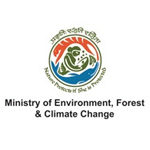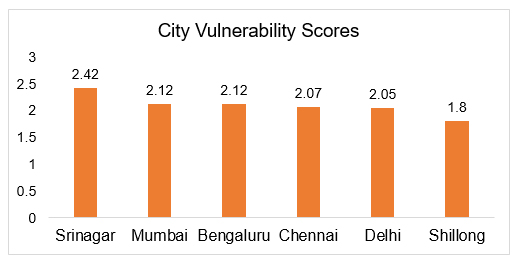Collaborators

- Project Status: Completed
- Project Area: Delhi, Mumbai, Bengaluru, Chennai, Srinagar and Shillong
- Funder: Ministry of Environment, Forest and Climate Change (MoEFCC), India
Overview:
Indian cities are highly vulnerable to climate induced natural hazards that lead to disruption of basic urban services. along with loss of human life. Cities need preparedness for quick response, recovery and risk reduction to check the loss to life and property in case of adverse events. There is thus a need for developing a methodology to assess climate vulnerability of cities. IRADe developed an Urban Climate Vulnerability Index (UVI) to assess and understand climate vulnerabilities and associated risks. UVI was developed for the cities of Srinagar, Shillong, Chennai, Mumbai, Bengaluru & Delhi. The cities were selected on the basis of geographical location, population and ecosystem types and vulnerability to the climate induced hazards. The climate vulnerability assessment framework covers seven thematic indicators- Physical, hazard, social, demographic, economic, infrastructure and administration vulnerabilities and seventy sub indicators and indices lying under the respective thematic heads. The prevailing vulnerability and preparedness of a specific city is a weighted aggregation of sub-indicators which were quantified, normalized and aggregated to obtain composite vulnerability indices of seven thematic indicators. The final climate vulnerability score is calculated for six cities and a consolidated climate vulnerability score card has been prepared comparing the vulnerabilities of each city. City specific recommendations for reducing the hazard vulnerability were made. The urban climate vulnerability index so devised, can serve as a decision support system to the Government of India for formulating adaptation and mitigation strategies for Indian cities.
Objective:
- To design a framework for assessment of Urban Climate Vulnerability of the cities.
- To identify and define sub-indices/indicators which can represent the climate vulnerability of urban areas.
- To design and test methodology for developing urban climate vulnerability index.
- To prepare Climate Vulnerability Profiles of the Selected cities using the identified indicators.
- To bring forth the areas of adaptation which the cities should prioritize for improving their resilience and integrate it to their developmental initiatives.
Outputs:
- A new Rapid Vulnerability Assessment (RVA) framework to understand and analyse climate resilient measures in India’s urban centres.
- Comprehensive City Vulnerability maps. (Geographic Information Systems (GIS) and Remote Sensing tools were used to collect, organize, analyse and present data).
- Climate vulnerability profiles of the selected cities.

Outcomes:
- Identification and development of objective verifiable indicators for developing urban climate vulnerability index.
- Replicable methodology for assessing urban vulnerability/climate resilience of the cities.
- Urban climate vulnerability index and resilience profile of 6 selected cities
- Sensitization of city, state and national stakeholders on climate data and methodology for assessing vulnerability of cities
- Adaptation strategies for building climate resilience of the 6 selected cities.